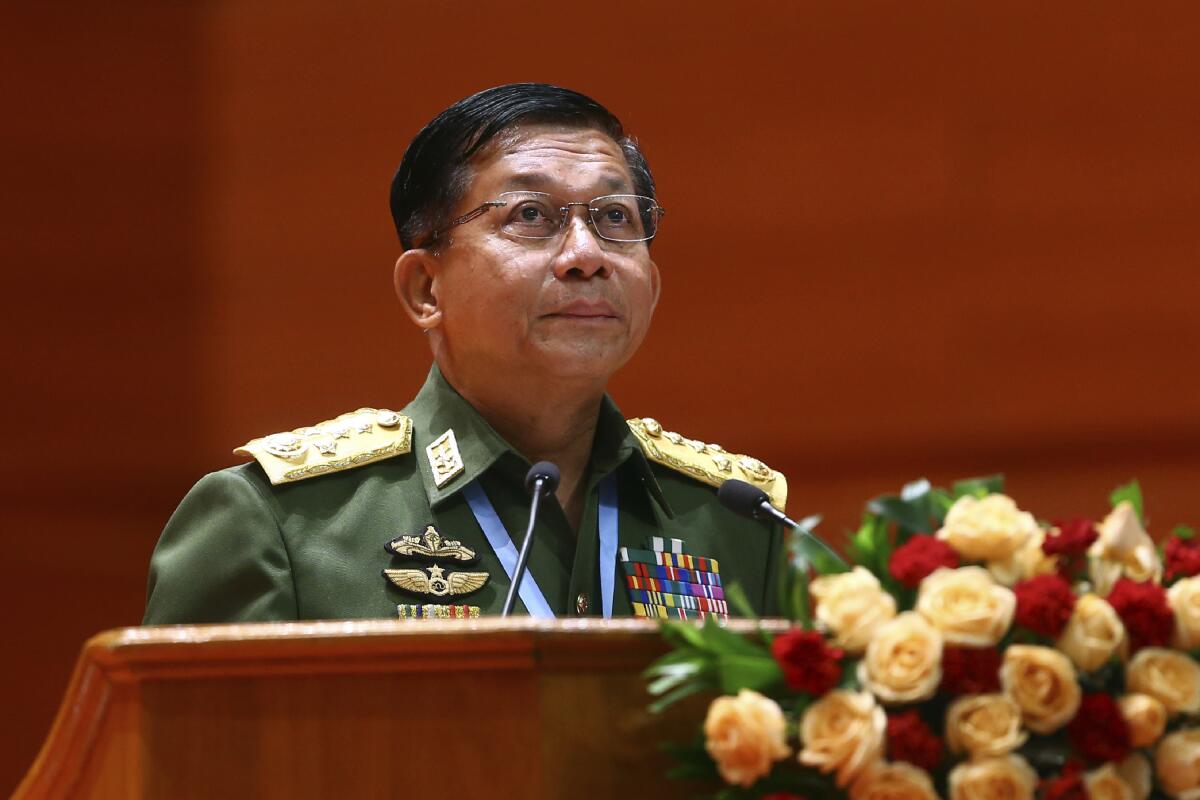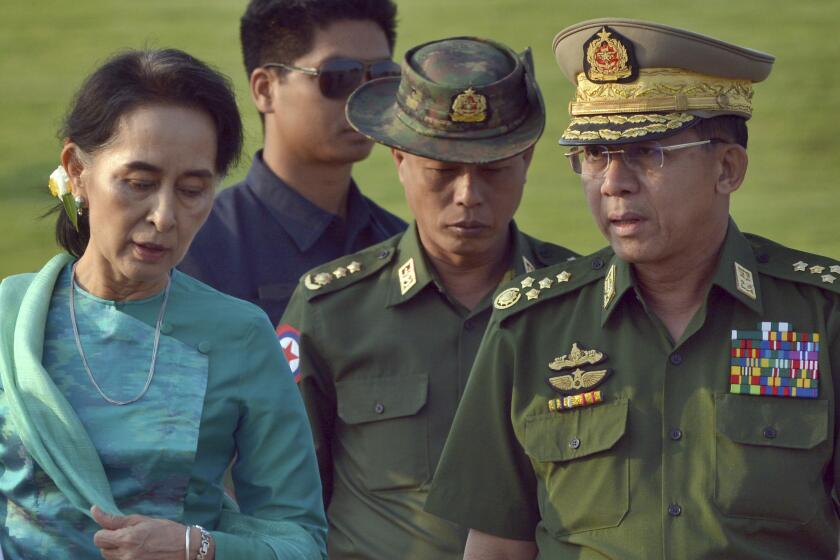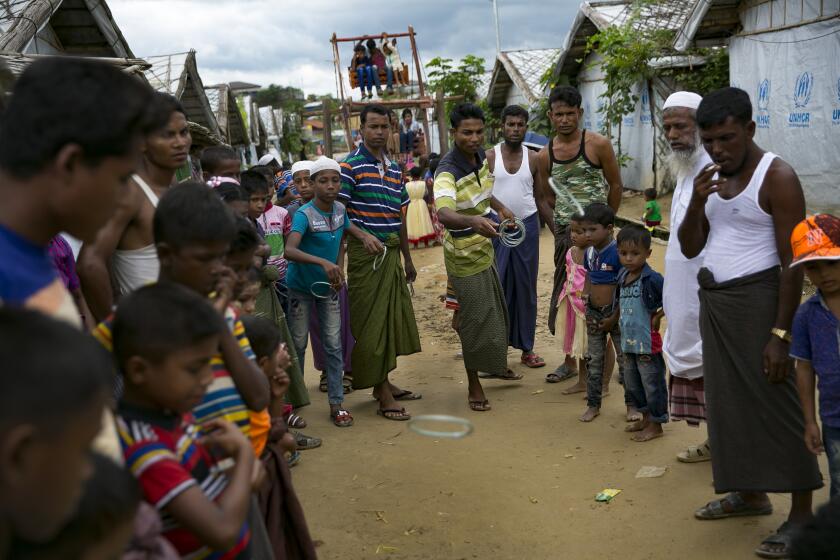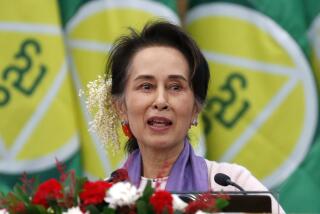With a coup, Myanmar’s military upended its comfortable status quo. Why?

- Share via
SINGAPORE — Myanmar’s military controls vast business interests in mining, telecommunications, textiles, hotels and even beer breweries and distribution. It faces no civilian oversight and can block changes to the country’s constitution. When it had to respond to international condemnation for its brutal repression of ethnic minorities, it trotted out members of its compliant civilian government to absorb the blame.
With such political and economic power, there seemed little for the military, known as the Tatmadaw, to complain about except for its lack of success at the ballot box, which it groundlessly blamed on voter fraud after elections in November.
So even close observers were surprised and puzzled by army leaders’ decision to stage a coup Monday, detaining prominent political figures such as Aung San Suu Kyi in early-morning raids and declaring one year of emergency rule. Now, the Tatmadaw is left with the sobering task of governing — a role it didn’t necessarily excel in during 49 years of chaotic military dictatorship that ended in 2011.
It faces a public health emergency in the COVID-19 pandemic, which has also triggered an economic crisis reminiscent of the one that precipitated a deadly popular uprising in 1988. Millions have been pushed into poverty over the last year, desperate enough for food to hunt rats and snakes in open sewers.
The nominal gains achieved by assuming total control could quickly be outweighed by sanctions imposed by the United States, the European Union and others that could disrupt Myanmar’s access to imports and, more important, the U.S. dollar.
The Biden administration on Tuesday called for the release of those detained Monday and formally branded the Myanmar government overthrow a military coup, a harsh label that under U.S. law triggers a host of punishments, including the suspension of foreign aid.
Foreign companies that entered joint ventures with the Tatmadaw’s conglomerates are likely to come under growing pressure to reconsider their investments. Already, Japanese brewer Kirin is facing scrutiny over its presence in Myanmar, where it dominates the beer market in a partnership with the military-owned Myanmar Economic Holdings Ltd.
Myanmar’s civilian leader made a Faustian bargain with the army for political gain, critics say. It ended with her detention in Monday’s coup.
Although no one outside the Tatmadaw knows for certain why it suddenly upended its comfortable status quo, some analysts say egos and political bickering inside Myanmar’s most powerful institution could be to blame.
“The military are not primarily motivated by financial concerns,” said Richard Horsey, a Myanmar-based analyst. “They never really have been. This is about pride, politics and personal ambition. More broadly, they have felt for some time that the civilian government was not giving them and their concerns due weight and respect, and was not following the constitutional rules.”
That includes Suu Kyi’s decision to circumvent a constitutional law barring her from the presidency by creating a higher position for herself in 2016, that of “state counselor.” And it probably included her refusal to entertain the military’s charges of election fraud by convening a special session of parliament over the matter.
“This seems to be the only way to explain the military’s actions, which are so fundamentally against its own interests and the interests of the country,” Horsey said.
The viral video shows a military convoy storming the gates of parliament in the capital Naypyidaw.
Although it was never out of the question, few in the country, also known as Burma, considered a coup likely given the Tatmadaw’s entrenched power behind the scenes. Suu Kyi and her party, the National League for Democracy, or NLD, also served a valuable purpose by giving Myanmar a veneer of democracy — enough to hold back calls for greater freedoms that inspired earlier generations to demonstrate against the military.
It wasn’t until late last month that the threat of a coup was taken more seriously after a military spokesman refused to rule it out if charges of election fraud went unaddressed.
Still, analysts saw the move as posturing to pressure the NLD into making political concessions that might improve the military’s performance in general elections.
Despite international criticism over her support of the military’s crackdownon the Muslim Rohingya minority, Suu Kyi is wildly popular within Myanmar and has twice led her party to landslide victories, first in 2015 and most recently Nov. 8.
The U.S. and its allies should respond to the Myanmar military’s seizure of power with swift, definitive, and coordinated actions.
Although the Tatmadaw itself is guaranteed 25% of the seats in parliament, its civilian political proxy, the Union Solidarity and Development Party, has never been able to win enough seats necessary for the two to combine as a majority and to form a government.
That has frustrated aging members of the Tatmadaw seeking careers in government after retirement from the army.
“There’s no longer any place for these senior military people to go,” said Gerard McCarthy, a postdoctoral fellow at the National University of Singapore’s Asia Research Institute. “They’re forced to retire quite young, and they feel like they still have decades to serve. This is the fundamental tension in the political system. The USDP simply can’t win an election.”
Myanmar’s new military ruler, the 64-year-old Senior Gen. Min Aung Hlaing, fits that mold. He staved off forced retirement as head of the Tatmadaw by extending his term in 2016 by five years. Some speculate that the coup was designed to preserve the general’s power as he reaches retirement age later this year.
Myanmar has approved the return of 3,450 Rohingya families, but none believes conditions are safe two years after the mass slaughter of Muslim civilians.
Min Aung Hlaing also holds top positions at Myanmar Economic Holdings and Myanmar Economic Corp., the secretive military-owned duopoly that has cornered the most lucrative parts of the economy. The two conglomerates have been challenged to some degree by demands for more transparency and calls by the United Nations and Amnesty International for a boycott because of the Tatmadaw’s dismal human rights record.
In his first public remarks since the coup, Min Aung Hlaing told his Cabinet on Tuesday that the military takeover was “inevitable” and insisted it was legal.
The U.S. has already imposed sanctions on the general in 2019 for his role in the brutal crackdown on the Rohingya, hundreds of thousands of whom have been displaced and terrorized in military sweeps.
A State Department official on Tuesday would not specify what sanctions or other judgments would be imposed, nor could the official say how much money in aid would be halted.
The official, who spoke on condition of anonymity to brief reporters, insisted suspension of aid would not hurt the Rohingya Muslim minority who receive U.S. assistance.
There’s no guarantee that Min Aung Hlaing can keep the public pacified during emergency rule. Supporters of Suu Kyi and the NLD could take to the streets, resulting in bloodshed. Fractures could emerge within the Tatmadaw. And any changes to the electoral system designed to boost the military-backed party’s chances could end up energizing the opposition and de-legitimizing future elections.
The cascade of potentially bad outcomes seems like a heavy price to pay for so little political gain, said Kim Jolliffe, an analyst based in Bangkok, Thailand, who specializes in Myanmar’s civil-military relations.
Breaking News
Get breaking news, investigations, analysis and more signature journalism from the Los Angeles Times in your inbox.
You may occasionally receive promotional content from the Los Angeles Times.
“There was really no threat to the military’s business interests, even with the most ambitious constitutional reforms pursued by the NLD,” he said. “They were never going to achieve them anyway. Nothing was going to change. Aung San Suu Kyi defended them at [The Hague]. She was a block on the potential mass unrest that kept the Tatmadaw awake at night under military rule.”
That safeguard is now gone, leaving Myanmar’s army rulers exposed, its international standing in tatters and its people bracing for what the next 12 months or more will bring.
Thant Myint-U, a closely followed Burmese historian and author, said in a tweet it was important to not lose sight of the toll the putsch would have on Myanmar’s increasingly desperate population.
“While everyone’s thinking about Myanmar politics please also think about Myanmar’s poor. Over 2020 lives of tens of millions have been descending into disaster [with] poverty rates soaring from 16 - 60%. Myanmar urgently needs vaccines and an equitable economic recovery (not a coup),” he tweeted.
Times staff writer Tracy Wilkinson in Washington contributed to this report.
More to Read
Sign up for Essential California
The most important California stories and recommendations in your inbox every morning.
You may occasionally receive promotional content from the Los Angeles Times.













